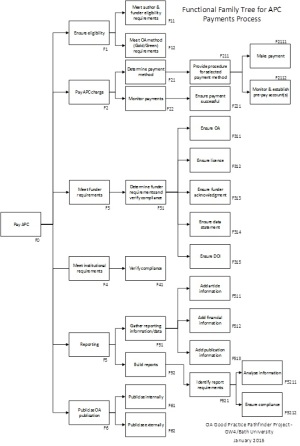We are really pleased to release a draft for comment of our report on analysis of the administrative costs of processing APC payments in the four universities of the GW4 alliance: Bath, Bristol, Cardiff and Exeter.
Functional Cost Analysis (FCA) methodology was used to investigate labour costs per APC payment and identify resource intensive functions with a view to later improvement.
The document is available here.GW4 FCA Report.
In a nutshell, after mapping the workflows at each institution and developing a functional family tree, the time and effort were recorded for each function and sub-function, giving us an idea of what was the most resource intensive. These were:
- Paying the APC
- Reporting
- Meeting funder requirements.
Additional points of information gleaned from the analysis included:
- Three of the four institutions had remarkably similar patterns around the implementation of APC payments.
- Payment by invoice tends to be the most resource intensive method and has the highest number of activities in the process.
- Adding suppliers to finance systems can add significant times to invoice payments.
- We can infer costs in the order of £50+ per simple APC for these comparable institutions, although this doesn’t account for problem investigation or incomplete data (the ‘Counting the Costs of Open Access’ report estimated £81 for directly attributable costs to research organisations.
- Other groups doing analysis around the APC payment process may find the Functional Family Tree useful as a starting point for breaking down the activities.
We did find Functional Cost Analysis a struggle, simply due to the dispersed nature of our group. FCA has its roots in engineering and manufacturing and is designed to identify where to target further investigation and improvement in a process. Next steps will be approached from a LEAN methodology, and may include work around:
- Use of pre-pay and credit card payments to lower payment costs
- Evaluate required frequency of some tasks (for example checking and reporting)
- Automate manual tasks e.g. compilation of reports
- Training lower grade staff to perform some of the tasks
An obvious but important finding evidenced by the report is that the larger the RCUK grant, the smaller the administrative costs and time for each APC payment. There are clear economies of scale.
